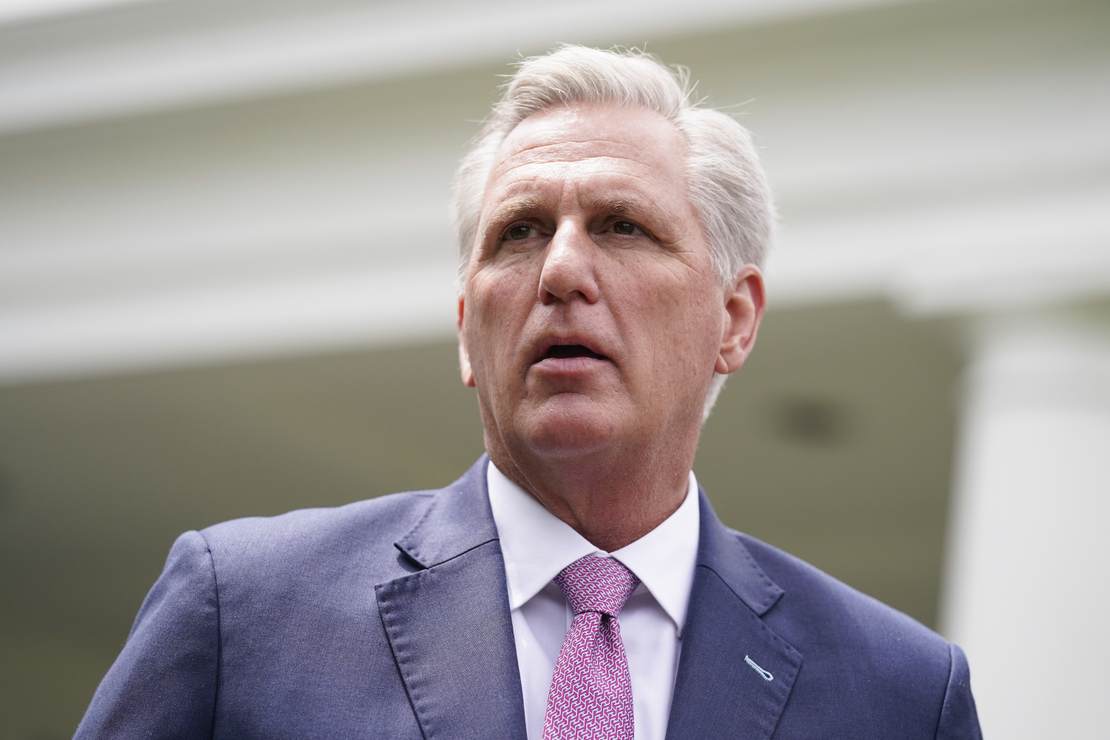
Good lord. Even I’m not this much of a pessimist.
We’ve finally reached the peak of “bedwetting season” on the right, it seems.
I think they’ll end up solidly in double digits but dreams of a 50-seat wave have been dashed by Democrat Pat Ryan’s upset in the NY-19 special election last week. Which, as CNN notes, creates a new problem for Kevin McCarthy. A big House Republican majority that includes many moderates who won swing districts is more likely to elect him Speaker and will also give him some leverage to say no to the MAGA wing of the caucus. If there are 250 GOP seats and, say, 30 of them are held by hardcore Trumpers, McCarthy can ignore the Trumpers and still get legislation passed.
Although that assumes he’d also be willing to ignore Trump. Which, no.
If instead McCarthy ends up with 230 Republican seats because the moderates on the ballot this fall all lost their races to Democrats, things get harder. The MAGA group would now have a veto over his legislative plans. And they might have the votes, with Trump’s backing, to install a Speaker more to their liking.
McCarthy will end up as Speaker in either scenario, I suspect, as he’s been careful to ingratiate himself to both wings of the caucus. But in the smaller-majority scenario, he might have a short leash before the populists convince their colleagues to throw him overboard and replace him with, say, Jim Jordan.
The smaller-majority scenario is now on the table.
Last year, McCarthy bullishly predicted a 60-seat gain, a landslide that would give them a comfortable majority in a chamber where Republicans only need a net gain of four seats to take back power. But now, Republican sources believe that a gain of 15-30 seats is more likely, and they are not ruling out the possibility of a gain in the single digits, a thin majority that would almost certainly give McCarthy headaches…
Still, some nervous Republicans are calling for a strategic plan to deal with a shifting political landscape, especially when it comes to their message and response on abortion rights — which has so far been disjointed or altogether non-existent.
“We are losing ground because of it,” one GOP lawmaker told CNN. “Roe caught Republicans off guard and we haven’t used it to paint the left as extreme nor shown any sort of compassion on the issue.”
“Republicans want to say, ‘inflation,’ as if that solves all our problems. It doesn’t,” the member added.
McCarthy should look on the bright side: A smaller majority would also theoretically empower what few moderates remain in the caucus by giving them a veto over legislation as well. In the 250-seat scenario, assuming there are 30 moderates, the Matt Gaetzes in the conference could demand that McCarthy go full MAGA on his agenda and ignore the moderates, who’d be unable to block bills brought to the floor. In the 230-seat scenario, the moderates matter. McCarthy could use them as a shield against the populists, arguing that he has no choice but to pursue more centrist policies since he won’t have 218 votes if he doesn’t.
But there too we run into a Trump problem. If the MAGAs want McCarthy to push a populist bill and the moderates are leery, how many moderates will dare vote no and block that bill once Trump begins threatening them with primaries if they do?
As I’m writing this, YouGov is out with this new poll. Yikes:
NEW: Our latest Battleground Tracker w/@CBSNews estimates Republicans are still poised to gain enough House seats for a majority, but their advantage has narrowed to 226 seats – down from 230 in July.https://t.co/kofXRNgZQg pic.twitter.com/cO9uFf2m0e
— YouGov America (@YouGovAmerica) August 28, 2022
READ RELATED: BoJo makes surprise visit to Kyiv on Independence Day, White House answers why Biden hasn't gone
That would be a double-digit pick-up. But only just.
Democrats holding onto the House would defy all laws of political gravity, as the in-party typically doesn’t gain seats in midterms when inflation is at historic highs and the president’s job approval is in the low 40s. But Ryan’s victory has Team Blue suddenly dreaming big, that the backlash to Roe might sweep aside other concerns and restore Democrats to total control of government next year. I think they’re kidding themselves, but you can’t fault them for reveling in a moment of optimism after having endured a horrible first half to 2022:
“I definitely feel a different energy than even three months ago, but certainly six months ago,” said Rep. Elissa Slotkin (D-Mich.) one of the year’s most vulnerable incumbents. Seeing a “narrow” path to keeping the majority, Slotkin added: “Six months ago I think people were putting safe bets on a real blowout. And I don’t see that happening.”
One House Democratic strategist, who like others interviewed for this story spoke on the condition of anonymity to speak candidly, was blunter in assessing what it would take to win the 218 seats required to control the House, in a chamber of 435 members. “The range has shifted. The world we were living in before, if we ended up in the 200s that was pretty good,” said the strategist. “Now it is much more that the majority is in play. We have a path. It is there.”…
A Democrat familiar with the Democratic Congressional Campaign Committee’s strategy, who spoke on the condition of anonymity to share internal deliberations, listed several Democratic lawmakers in the DCCC’s “Frontline” incumbent protection program who no longer worry party leadership. They include Democratic Reps. Chrissy Houlahan (Pa.); Bill Foster (Ill); Mikie Sherrill (N.J.); Jennifer Wexton (Va.) and Kathy E. Manning (N.C.), according to this person. Biden won handily in each district, taking between 55-58 percent of the vote there.
One Dem lobbyist put it this way for WaPo: “There is a big difference between having a zero chance of success and a 30 percent chance of success. And if we do the right things over the next month, and go out and sell the accomplishments of the last year, we could have a 50 percent chance.” I doubt they’ll ever make this election a true toss-up — gravity always wins, as Thom Yorke once said — but if everything were to break right for the party over the next two months then … maybe November could be interesting? If we get two more blockbuster jobs reports, if gas prices continue to drop steadily, if inflation starts to decline…
…maybe?
Can you imagine having Nancy Pelosi back as Speaker again next year? Some Democrats have quietly begun to imagine it.
I’ll leave you with this, one of the first polls to capture public reaction to Biden’s terrible new student-loan forgiveness plan. It’s impossible to tell from this data how much the issue might influence the midterms, as everything depends on how much the subject motivates voters on each side. But looking at this, you don’t come away thinking it’s a political disaster for Democrats. Even though it should be.
10k loan forgiveness perception by age:
18-34
21% too much
44% not enough
35% just right35-49
27% too much
37% not enough
35% just right50-64
40% too much
23% not enough
37% just right65+
53% too much
16% not enough
32% just righthttps://t.co/UPyL9q6GBe— Emerson College Polling (@EmersonPolling) August 26, 2022
Source:





